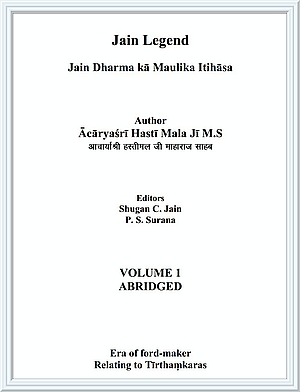The 11th Tīrthaṃkara after Lord Śrī Śītalanātha was Śrī Śreyāṃsanātha. Śrī Śreyāṃsanātha was the son of Viṣṇudevī, queen of the king Viṣṇu of Siddhapurī city. In his previous incarnation he was the king Nalinagulma of the island Puṣkara. Giving up royal enjoyments which seemed akin to the disease of (obsession for) royalty he took initiation under monk Vajradanta and wandering about and devoid of passions he obtained the Tīrthaṃkara nāmakarma by 20 instruments / reflections (sthānakas). Ultimately, completing his life-span in pure meditation Nalinagulma became a god with extraordinary powers (ṛddhidhārī) in the Mahāśukra kalpa (heaven).
On the 6th day of the dark half of the month Jyeṣṭha under Śravaṇa constellation Nalinagulma's soul left the heavenly abode and entered queen Viṣṇudevī's womb. The mother saw 14 auspicious dreams that night. Completing her pregnancy period, she gave birth to a son on the 12th day of the dark fortnight of Fālguna. The entire royal family and the kingdom benefitted from the birth of the boy hence his parents named him Śreyāṃsanātha. When he entered his youth, on his father's request he married suitable women. At the age of 21 lakh years he became the king. For 22 lakh years he managed the kingdom judiciously.
After his karmas of enjoyment became futile when he expressed the desire to follow the spiritual path accordingly the lokāntika gods requested him. For a year he gave charities and on the 13th day of the dark fortnight of Fālguna under constellation Śravaṇa; he, along with 1000 other kings, observed the 'belā' fast, taking initiation as a mendicant. At Sahasrāmravana under the Aśoka tree, renouncing all bad karmas he became a monk / renouncer. The next day he broke his fast at the home of king Nanda of Siddhārthapura with rice pudding. After initiation he wandered about for two months as mendicant, bearing with all kinds of hardships with determination and firmness. Observing a fast, ascending the kṣapakaśreṇi on the day of the new moon in conjunction in the month of Māgha, destroying obscuring karmas, he attained pure intuition and pure knowledge. This way, becoming a kevalī, Lord Śreyāṃsanātha addressed a large gathering of gods-men about scripture and conduct and establishing the four-fold order, became a Tīrthaṃkara. After attaining pure knowledge, Lord Śreyāṃsanātha, wandering about, reached Potanapura. Tripṛṣṭha became delighted at the news of his coming and reached to offer worship at the feet of the Lord with his elder brother Acala Baldeva. Hearing the speech like a shower of nectar of samyakdharma both brothers accepted the path of self-discipline. Prince Tripṛṣṭha and Acala Baladeva were the sons of king Prajāpati and the first Vasudeva and first Baladeva, respectively, of avasarpiṇī cycle.
The previous incarnation of Lord Mahāvīra, Marīci's soul, in fact, was born as Tripṛṣṭha. When the first Prati Vasudeva, Aśvagrīva, heard the prophecy from his occult astrologers about the birth of one who would kill him, worried, he started looking out for his rival.
When he learnt of Tripṛṣṭhakumāra slaying the fearsome lion in Śālīkheta and freeing people from its terror, he understood that Tripṛṣṭhakumāra would be his slayer. Knowing this he decided to get both the brothers killed on the sly by inviting them and sent a message through king Prajāpati. In response to this message Tripṛṣṭha sent the message "We are not ready to take any rewards from a king who could not even kill a lion." Hearing this Aśvagrīva was filled with anger and attacked Prajāpati with an army. In order to prevent unnecessary killing of men on the battlefield, Tripṛṣṭha challenged Aśvagrīva to a duel, whereby, killing Aśvagrīva, Tripṛṣṭha became sovereign of half of Bharata.
One day, while enjoying sweet music, when it was time for him to sleep, he instructed the doorkeeper of the sleep chamber that if he fell asleep the music must be stopped. Lost in the melodious music, the attendant forgot the instructions of Tripṛṣṭha. When Tripṛṣṭha woke up and found the music still playing, in anger he ordered hot glass to be poured into the ears of the doorkeeper, who died in pain. Tripṛṣṭha's restraint was destroyed by this cruel act and he attained to a life in hell. After 84 lakh pūrvas of life-span he went to the seventh hell.
When Baladeva heard of the death of his brother, becoming overwhelmed by grief due to brotherly love, losing reason, he cried pitiably and fainted. Recovering consciousness, being advised by elders to self-reflect, he realised the meaninglessness of the world and turning his back to worldly matters, taking initiation from Ācārya Dharmaghoṣa, destroying all karmas through austerities and restraint, became enlightened and liberated. His life span was 85 lakh pūrvas.
After attaining pure knowledge Lord Śreyāṃsanātha wandered for two months less than 21 lakh years around the world, showing the path of self-salvation to living beings. Sensing his life coming to an end, observing fast along with 1000 monks, in the third stage of deep meditation, stopping all activities and getting rid of all karmas, he became enlightened and liberated on the 3rd day of the dark fortnight of Śravaṇa month under constellation Dhaniṣṭhā.
He was 84 lakh years old. The congregation of Lord Śreyāṃsanātha had 76Gaņadharas, 6500 omniscient, 6000 telepaths, 6000 clairvoyants, 1300 14-pūrvadhārīs, 11000 vaikriyalabdhidhārīs, 5000 vādīs, 84000 monks, 103000 female-monks, 279000 votaries and 448000 female-votaries.
 Acharya Hasti Mala
Acharya Hasti Mala
